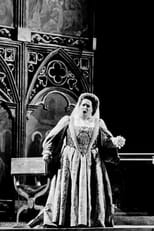

Alain Fondary
Born: October 9, 1932
in Bagnolet, Seine-Saint-Denis, France
in Bagnolet, Seine-Saint-Denis, France
Alain Fondary (born 9 October 1932 in Bagnolet) is a French baritone.
Before embarking on his lyrical career, Alain Fondary followed the family tradition of glass blower, like his parents, in Paris, Boulevard Voltaire. He attended glass school and went to opera with his parents and José Luccioni, a friend of the family. Passionate about judo, he nevertheless worked on singing at the age of thirty, first with André Baugé, then with Georges Jouatte and André Hauth, then with Yvonne Pons, Alice Monfort and Gaetano Abrani.
He made his debut in Cherbourg in Pagliacci by Ruggero Leoncavallo, performing the role of Tonio in 1968 and the following year sang Ourrias in Mireille by Charles Gounod in Toulouse. He created Les Boréades by Jean-Philippe Rameau, under the direction of Gardiner in London in 1980. His career accelerated in Bercy in 1984, when he replaced Piero Cappuccilli in Aida by Verdi, where he played Amonasro; he was then offered the biggest stages. The following year he sang at the Chorégies d'Orange, at Covent Garden, and La Scala. In 1987, he made his American debut in San Francisco in the role of Scarpia of Tosca by Giacomo Puccini and the following year at the MET in Cavalleria rusticana by Pietro Mascagni and Aida; later operas in which he sang in New York included La gioconda, Samson et Dalila, La fanciulla del west and Tosca. In Munich, he sang in Les Contes d'Hoffmann. In Paris, he sang in Thaïs by Jules Massenet and Rigoletto by Verdi. He appeared for the first time at the Easter festival of Salzburg in 1989 in Tosca alongside Luciano Pavarotti and under the direction of Karajan, and in Carmen in Paris. The following year he was asked to play at the Wiener Staatsoper; in 1992 he played Falstaff in Buenos Aires.
In March 2008, he played the role of Sultan Alaouddin in Padmâvatî by Albert Roussel, under the direction of Lawrence Foster, at the Théâtre du Châtelet.
His repertoire comprises more than thirty roles including Tosca, La Gioconda, Hérodiade, Henry VIII, Samson and Dalilah, Thaïs, Jérusalem, and the great verdian roles: Macbeth, Rigoletto, Don Carlos, Othello, Simon Boccanegra, Aida, Nabucco, Falstaff as well as Les Contes d'Hoffmann and la Grande Duchesse de Gerolstein.
He has also premiered works by Charles Chaynes, including Cecilia at Monte-Carlo in 2000,[1] revived in Avignon in January 2005 and Mi amor in March 2007 in Metz.
Source: Article "Alain Fondary" from Wikipedia in English, licensed under CC-BY-SA 3.0.
Before embarking on his lyrical career, Alain Fondary followed the family tradition of glass blower, like his parents, in Paris, Boulevard Voltaire. He attended glass school and went to opera with his parents and José Luccioni, a friend of the family. Passionate about judo, he nevertheless worked on singing at the age of thirty, first with André Baugé, then with Georges Jouatte and André Hauth, then with Yvonne Pons, Alice Monfort and Gaetano Abrani.
He made his debut in Cherbourg in Pagliacci by Ruggero Leoncavallo, performing the role of Tonio in 1968 and the following year sang Ourrias in Mireille by Charles Gounod in Toulouse. He created Les Boréades by Jean-Philippe Rameau, under the direction of Gardiner in London in 1980. His career accelerated in Bercy in 1984, when he replaced Piero Cappuccilli in Aida by Verdi, where he played Amonasro; he was then offered the biggest stages. The following year he sang at the Chorégies d'Orange, at Covent Garden, and La Scala. In 1987, he made his American debut in San Francisco in the role of Scarpia of Tosca by Giacomo Puccini and the following year at the MET in Cavalleria rusticana by Pietro Mascagni and Aida; later operas in which he sang in New York included La gioconda, Samson et Dalila, La fanciulla del west and Tosca. In Munich, he sang in Les Contes d'Hoffmann. In Paris, he sang in Thaïs by Jules Massenet and Rigoletto by Verdi. He appeared for the first time at the Easter festival of Salzburg in 1989 in Tosca alongside Luciano Pavarotti and under the direction of Karajan, and in Carmen in Paris. The following year he was asked to play at the Wiener Staatsoper; in 1992 he played Falstaff in Buenos Aires.
In March 2008, he played the role of Sultan Alaouddin in Padmâvatî by Albert Roussel, under the direction of Lawrence Foster, at the Théâtre du Châtelet.
His repertoire comprises more than thirty roles including Tosca, La Gioconda, Hérodiade, Henry VIII, Samson and Dalilah, Thaïs, Jérusalem, and the great verdian roles: Macbeth, Rigoletto, Don Carlos, Othello, Simon Boccanegra, Aida, Nabucco, Falstaff as well as Les Contes d'Hoffmann and la Grande Duchesse de Gerolstein.
He has also premiered works by Charles Chaynes, including Cecilia at Monte-Carlo in 2000,[1] revived in Avignon in January 2005 and Mi amor in March 2007 in Metz.
Source: Article "Alain Fondary" from Wikipedia in English, licensed under CC-BY-SA 3.0.
Movies for Alain Fondary...

Title: Jérusalem
Character: Il conte di Tolosa
Released: November 30, 2000
Type: Movie
Jérusalem is a grand opera in four acts by Giuseppe Verdi. The libretto was to be an adaptation and partial translation of the composer's original 1843 Italian opera, I Lombardi alla prima crociata. It was the one opera which he regarded as the most suitable for being translated into French. Live from the Teatro Carlo Felice di Genova, November 2000.


Title: Carmen
Character: Escamillo
Released: June 10, 1989
Type: Movie
Filmed production of Bizet’s Carmen at Earls Court in London, June 1989.


Title: Verdi: Simon Boccanegra
Character: Paolo Albiani
Released: July 13, 1985
Type: Movie
The ambiguities of Verdi’s theatre are particularly clear in his baritone roles, among which is that of Boccanegra, corsair turned doge of Genoa and the troubled observer of the conflicts that tore apart 14th century landowners and peasants. An eminently political opera in which power struggles are interwoven with family conflicts, Simon Boccanegra echoes the life of its composer – the man who championed the cause of Italian unification and overcame the loss of his wife and children.




